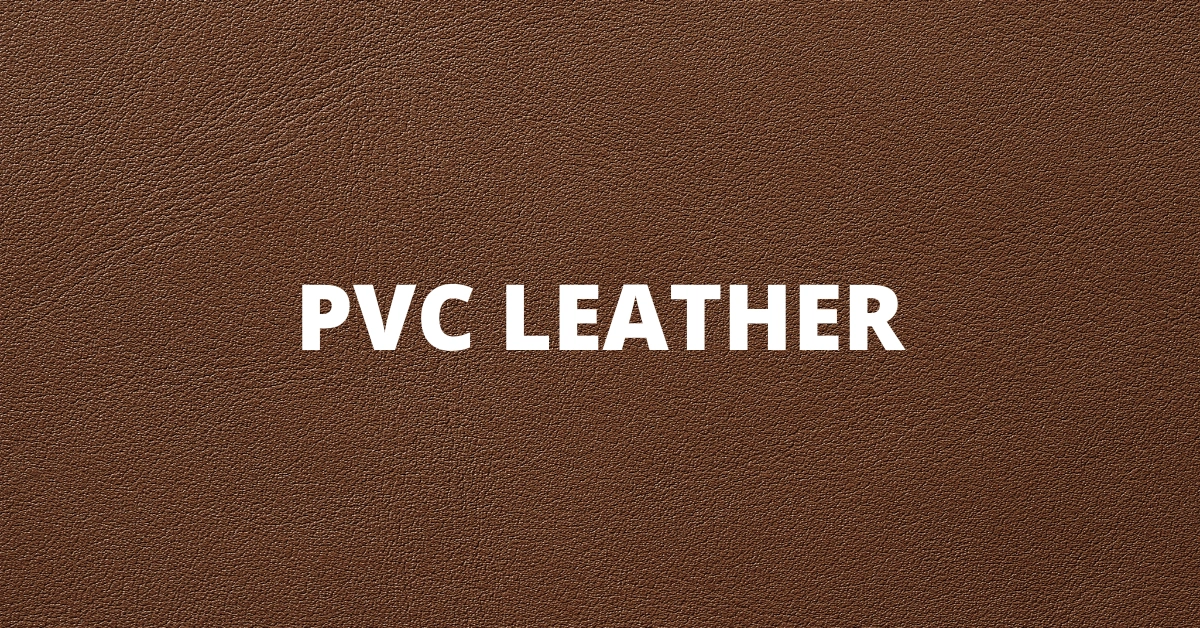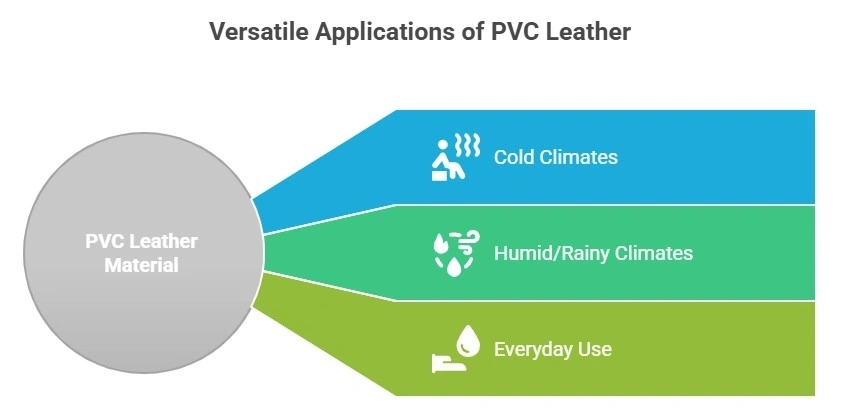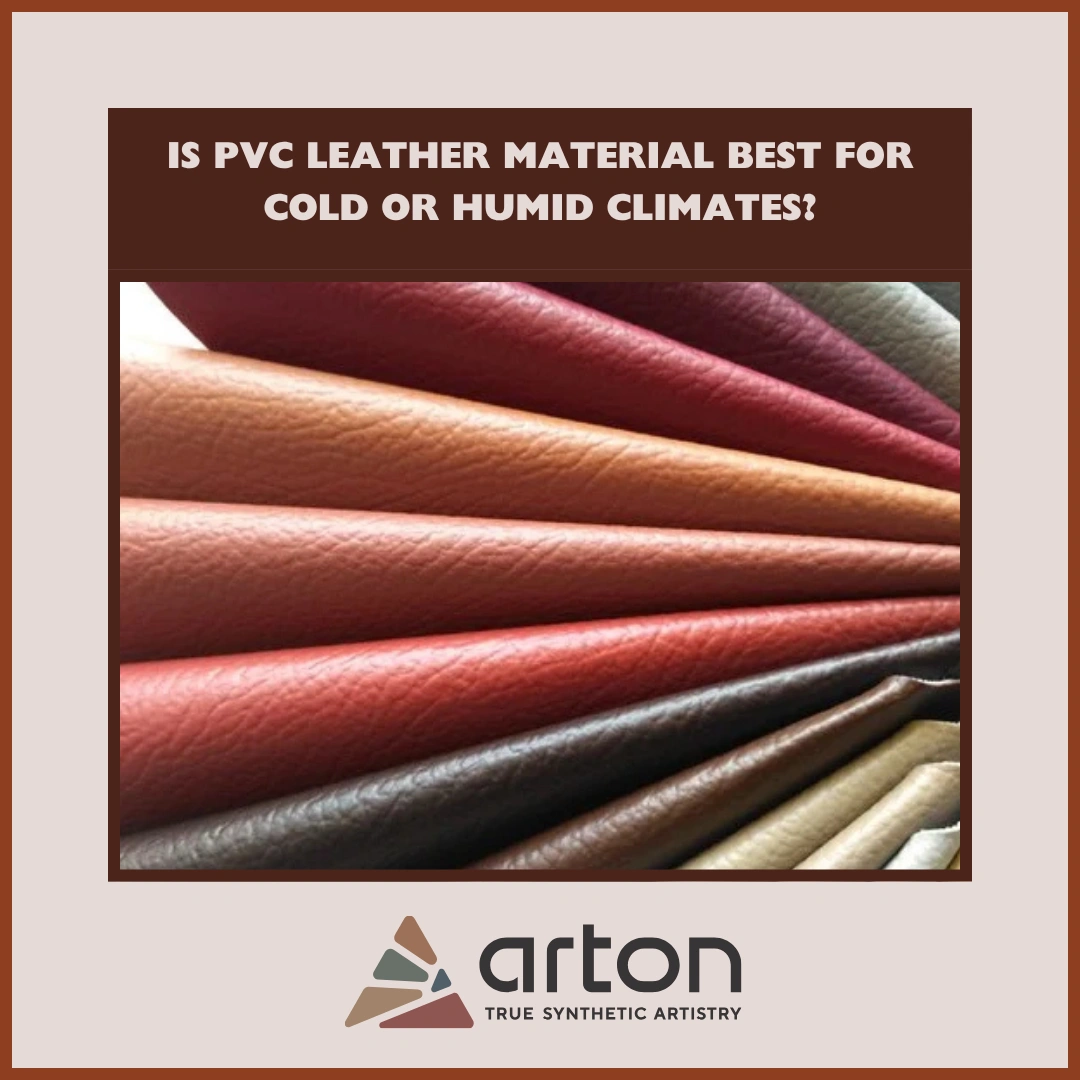07 August, 2025
When choosing upholstery or fashion materials, climate compatibility is often overlooked—but it shouldn’t be. Materials like PVC leather have specific strengths and weaknesses depending on temperature and humidity. So, is PVC leather material best for cold or humid climates? Let’s explore how it performs and where it excels.
By opting to use upholstery material or fashion materials, the climatic compatibility is not usually given consideration; however, it must be. Such materials as PVC leather possess certain characteristics and disadvantages with regard to temperature and humidity. So, which climate is more suitable to use PVC leather material, cold or humid? So how does it fare and what is it good at?
What is PVC Leather Material?

Polyvinyl chloride leather also called PVC leather is a synthetic leather produced by coating a textile backing using a film of PVC, in most cases polyester. It is completed with such additives as plasticizers in order to provide it with flexibility and durability.
It is widely used in car seats, furniture, bags and even shoes as a cheap substitute of real leathers. It is waterproof, can be washed without much effort, and comes in numerous textures and colors unlike real leather.
But how does this PVC leatherette fabric hold up in different climates?
How Does PVC Leather React to Cold Climates?
PVC leather becomes rigid when the temperature is low. When the material is subjected to a freezing condition, it might turn brittle and tend to crack more due to wear with time-tension in the product can also enhance this effect such as on car seats and boots.
PVC leather is also not warm inherently, but can use padded backing material to add warmth. But there is not much in terms of breathable PVC leather and it could be cold to touch in winters.
Key points:
- Insulates heat, keeps surfaces warmer
- Maintains structural integrity in cold
- May become less supple in freezing conditions
Is PVC Leather Material Good for Humid Climates?
The water resistance is one of the most powerful benefits of PVC leather in the humid environments. However, unlike real leather, which collects moisture and is susceptible to mold and mildew, PVC leather is water resistant meaning it can be wiped down easily.
Nevertheless, it is again a drawback of breathability. PVC leather material may trap heat and sweats in hot and humid environments so that they become comfortable to sit or wear in the long run. Nonetheless, it remains a favorite as outdoor furniture or even rain-proof jackets where waterproofing is key.
Key points:
- Naturally waterproof and easy to clean
- Resistant to mildew and mold
- Excellent for tropical or coastal areas
PVC vs PU: Which is Better for Your Climate?
PU vs PVC: which is better? While both are synthetic, PVC leather is known for its rugged durability and exceptional water resistance. PU leather, or polyurethane leather, is softer, more breathable, and feels more like genuine leather, but it’s not as tough against moisture or rough handling.
| Property | PVC Leather | PU Leather |
| Water Resistance | Excellent | Moderate |
| Breathability | Low | High |
| Comfort in Heat | Less comfortable | More comfortable |
| Durability | High | Moderate |
| Flexibility in Cold | Moderate | Better |
For humid or rainy regions, PVC leather is recommended for its superior water-proofing and easy upkeep.
For extreme cold, PVC retains shape but may be less soft; for maximum comfort in wearable goods, PU is preferred.
Pros and Cons of PVC Leather in Various Climates
Pros:
- Excellent water and moisture resistance
- Cost-effective and easy to clean
- Durable and ideal for humid or wet areas
Cons:
- Less breathable, may feel hot and sticky in warm, enclosed spaces
- Can stiffen in severe cold
- May not mimic the luxurious feel of genuine or PU leather
Best Applications of PVC Leather Material by Climate

Cold Climates:
- Car seats and steering wheel covers (heat retention)
- Winter boots, jackets with insulation focus
Humid/Rainy Climates:
- Marine upholstery and boat seating
- Outdoor furniture and patio upholstery
- Restaurant seating, public transport, waiting rooms
Everyday Use:
- Office chairs, sofas, headboards, and areas where spills are likely
Conclusion
So, is PVC leather material best for cold or humid climates? In most cases, PVC leather where moisture protection, durability, and cost-efficiency are key. It is favored for environments exposed to humidity, rain, or frequent spills, and it retains warmth well in cold settings. Be aware that in very warm, enclosed areas, the lack of breathability may reduce comfort. Always balance climate needs with personal and aesthetic preferences before making your final choice.
By considering the climate where your new PVC leather items will be used, you can select upholstery or accessories that offer lasting value, easy care, and all-weather performance.
At Rock Uniquoters, we specialize in manufacturing and supplying premium synthetics leather solutions that combine aesthetic appeal with practical performance.
People Also Ask
What is PVC leather material made of?
PVC leather is made by coating a fabric base with polyvinyl chloride (PVC) and plasticizers to create a leather-like surface that’s water-resistant and easy to clean.
Is PVC leather good quality?
While it's not real leather, PVC leather can offer good quality depending on the manufacturing process. It's durable, affordable, and suitable for many practical applications.
Is PVC leather better than real leather for humid areas?
Yes, in many cases. PVC fake leather resists water and humidity better than natural leather, which can absorb moisture and develop mold.
Does PVC leather crack in the cold?
Yes, prolonged exposure to very cold temperatures can make PVC leather brittle, leading to cracks—especially if the product is repeatedly bent or stressed.



